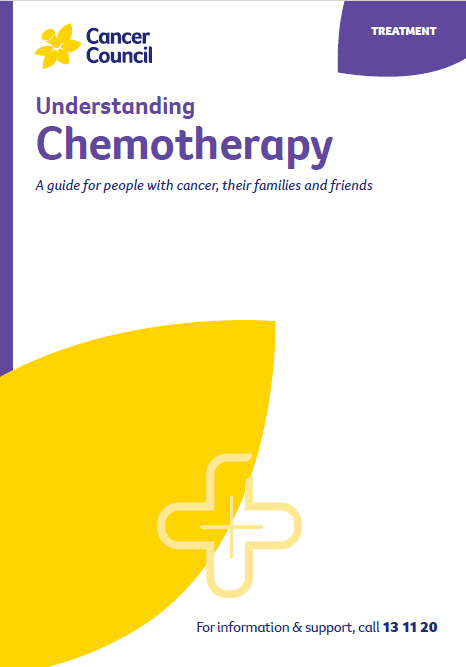- Home
- Hodgkin lymphoma
- Treatment
- Chemotherapy
- Side effects of chemotherapy
Side effects of chemotherapy
Chemotherapy drugs work mainly on fast-growing cells, such as lymphoma cells. However, the drugs may also damage other types of fast-growing cells, such as hair follicles, blood cells, and cells inside the mouth or bowel. This can cause side effects.
Learn more about:
Overview
Some people may have few side effects, while others may have several. Most side effects are temporary and can be managed, however, fatigue can build up over time and become worse with each treatment cycle. Some side effects may show up months or years after treatment. These are called late effects.
Before treatment, your health care team will tell you what side effects to expect and how to manage them. It is important to discuss any side effects of treatment with your doctor or nurse. They may need to closely monitor the problem or change your treatment. Some of the common side effects are below.
Common side effects of chemotherapy
Different chemotherapy drugs can have different side effects, and everyone reacts to chemotherapy differently. For more information about chemotherapy and ways to manage side effects, call Cancer Council 13 11 20 or see our general section on Chemotherapy.
FatigueSevere tiredness and lack of energy (fatigue) may make you feel weak and exhausted. These feelings can last for several weeks or months after chemotherapy. Check with your doctor whether your fatigue is related to a low red blood cell count (anaemia). This can be treated with blood transfusions. Otherwise, keeping active and exercising can help you feel less fatigued.For more on this, see Fatigue and cancer and listen to our podcast on Managing Cancer Fatigue. | |
Increased risk of infectionsChemotherapy reduces your white blood cell level (neutropenia and lymphopenia), making it harder for your body to fight infections.Learn ways of reducing your risk of infection. | |
Nerve and muscle effectsSome chemotherapy drugs can cause nerve damage (peripheral neuropathy). Symptoms can include tingling, pain or loss of feeling in your fingers and/or toes, and muscle weakness in your legs. These side effects usually disappear after treatment ends, though they can last a long time or even be permanent.For more on this, see Peripheral neuropathy and cancer. | |
Thinking and memory changesSome people say they have difficulty concentrating, focusing and remembering things after they have had chemotherapy. These problems usually improve with time, but some people experience issues for months or years.For more on this, see Changes in thinking and memory. | |
Bleeding or bruisingA drop in the number of platelets in your blood (thrombocytopenia) can cause prolonged bleeding from small cuts or make you bruise easily. You may have a blood transfusion to increase your platelet count. | |
Hair thinning or hair lossYou may lose some hair from your head, eyebrows and eyelashes. Your hair will grow back after treatment, but it may look or feel different. You may be able to borrow a wig from a wig library. If you have private health insurance, your fund may cover part of the cost of a wig.For more on this, see Hair loss. | |
Nausea and vomitingBefore each chemotherapy session, you will usually be given anti-nausea medicine to stop you feeling sick or vomiting, as well as medicines to take at home. You may take several different types of medicine, and these usually work well. Talk to a dietitian about adjusting what you eat.For more on this, see Nutrition and cancer and listen to our podcast on Appetite Loss and Nausea. | |
Dental problemsIf your platelet count falls, your gums may bleed more easily. You may also develop mouth sores or infections. Use a soft toothbrush and see your dentist for regular check-ups. Check with your treatment team before having major dental work.For more on this, see Mouth health and cancer treatment. |
Fertility and cancer treatment
Some types of chemotherapy and radiation therapy can affect the ability to have children naturally. If you produce sperm, you may not make as many, and if you have periods, they may become irregular or stop permanently (menopause).
Most people treated for Hodgkin lymphoma don’t become infertile.
Your doctor will talk to you about the risk and refer you to a fertility specialist if it may be an issue for you. If there is enough time before treatment begins, you may be able to preserve some semen or freeze embryos or eggs.
For more on this, see our general section on Fertility and cancer.
→ READ MORE: Taking care with infections
Podcast: Managing Cancer Fatigue
Listen to more of our podcast for people affected by cancer
More resources
Prof Mark Hertzberg AM, Head, Department of Haematology, Prince of Wales Hospital; Dr Puja Bhattacharyya, Haematology Staff Specialist, Western Sydney Local Health District – Blacktown Hospital; A/Prof Susan Carroll, Senior Staff Specialist, Radiation Oncology, Royal North Shore Hospital and University of Sydney; Gerry Flanagan, Consumer; Alisha Ganesh, Haematology Clinical Nurse Consultant, Concord Repatriation General Hospital; Kelly King, Cancer Council Liaison, Central Coast Cancer Centre; Ilana Krug, Social Worker – Haematology and Oncology, Gosford Hospital; Amy McGee, Consumer.
View the Cancer Council NSW editorial policy.
View all publications or call 13 11 20 for free printed copies.

